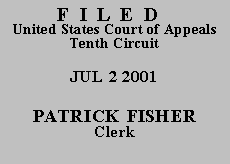

| JERRY RASNIC, SR.,
Petitioner-Appellant, |
|
| v. | |
| LOUIS E. BRUCE; CARLA STOVALL,
Attorney General,
Respondents-Appellees. |
|
Petitioner Jerry Rasnic, Sr., a state prisoner appearing pro se, seeks a certificate of appealability (COA) to challenge the district court's denial of his 28 U.S.C. § 2254 petition for writ of habeas corpus. Because Rasnic has failed to make "a substantial showing of the denial of a constitutional right" under 28 U.S.C. § 2253(c)(2), we deny his request for a COA and dismiss his appeal.
In 1990, Rasnic entered a plea of guilty to two counts of aggravated robbery and one count of aggravated burglary. He was sentenced to terms of imprisonment of fifteen years to life on each aggravated robbery count and to not less than five years nor more than twenty years on the aggravated burglary count, with all sentences to run consecutively. Rasnic did not file a direct appeal. In 1995, he filed a motion for state habeas relief pursuant to Kan. Stat. Ann. § 60-1507. After conducting an evidentiary hearing during which Rasnic testified, the state district court denied relief. The Kansas Court of Appeals subsequently affirmed the denial of relief.
On October 6, 2000, Rasnic filed his petition for federal habeas relief pursuant to 28 U.S.C. § 2254. The petition asserted two claims for relief: (1) trial counsel was ineffective for failing to investigate and prepare a proper defense to the criminal charges against Rasnic, for failing to prepare and present mitigating evidence at the sentencing hearing, for failing to file a direct appeal, and for failing to advise Rasnic of his right to file a direct appeal; and (2) his sentences were constitutionally disproportionate to those imposed on his co-defendants. The federal district court denied relief on April 10, 2001, and subsequently denied Rasnic a COA.
Under the Antiterrorism and Effective Death Penalty Act of 1996 (AEDPA), a state prisoner such as Rasnic is not entitled to federal habeas relief unless the state court adjudication of the merits of his claims "resulted in a decision that was contrary to, or involved an unreasonable application of, clearly established" Supreme Court precedent or "resulted in a decision that was based on an unreasonable determination of the facts in light of the evidence presented in the State court proceeding." 28 U.S.C. § 2254(d). In other words, we could grant Rasnic habeas relief only if we were to find "the state court arrived at a conclusion opposite to that reached by the Supreme Court on a question of law; decided the case differently than the Supreme Court has on a set of materially indistinguishable facts; or unreasonably applied the governing legal principle to the facts of [Rasnic's] case." Van Woudenberg v. Gibson, 211 F.3d 560, 566 (10th Cir. 2000) (citing Williams v. Taylor, 529 U.S. 362, 413 (2000)), cert. denied, 121 S. Ct. 1117 (2001).
Having carefully reviewed the record on appeal, including the state court records from Rasnic's criminal proceedings and his subsequent state habeas proceedings, we are convinced that Rasnic is not entitled to federal habeas relief. In rejecting Rasnic's ineffective assistance of counsel claim, the Kansas state courts concluded that Rasnic failed to satisfy either prong of the standard announced in Strickland v. Washington, 466 U.S. 668, 687 (1984), i.e., deficient performance and prejudice. Nothing in the record on appeal persuades us that the Kansas courts unreasonably applied the Strickland standards to the facts of Rasnic's case in reaching this conclusion. As for Rasnic's assertion that his total sentence was constitutionally disproportionate to the sentences imposed on his co-defendants, the Kansas courts noted "there [wa]s a reasonable basis for treating [Rasnic] differently than his co-defendants." Record of Kansas Post-Conviction Proceedings, Vol. I at 72. In particular, the Kansas courts noted that (1) unlike Rasnic, none of his co-defendants had a prior criminal history, (2) Rasnic "was found by the trial court to be the 'ring leader' of the criminal enterprise," (3) "[t]hree of the four co-defendants were [Rasnic's] sons," and (4) "[a]ll [of the co-defendants] were much younger than [Rasnic]." Id. Again, nothing in the record on appeal persuades us that the Kansas courts unreasonably applied governing legal principles in rejecting this claim. Rasnic has therefore failed to make a "substantial showing of the denial of a constitutional right" as required by 28 U.S.C. § 2253.
We DENY Rasnic's request for a COA and DISMISS this appeal. The mandate shall issue forthwith.
Entered for the Court
Mary Beck Briscoe
Circuit Judge
*.This order and judgment is not binding precedent, except under the doctrines of law of the case, res judicata, and collateral estoppel. The court generally disfavors the citation of orders and judgments; nevertheless, an order and judgment may be cited under the terms and conditions of 10th Cir. R. 36.3.